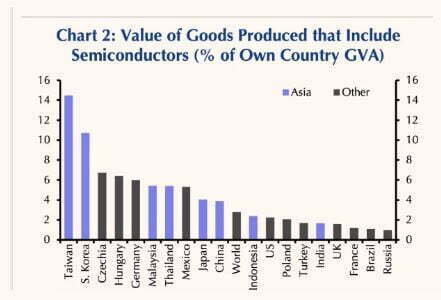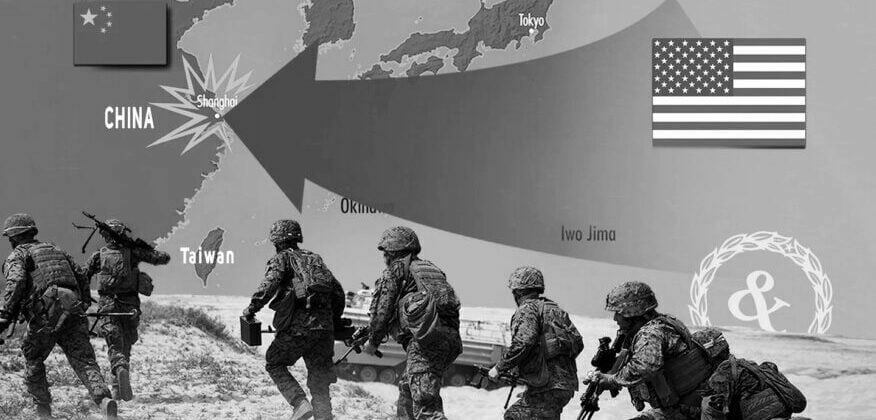Perhaps the balloons in the sky of recent days are foreboding of what some feel is an inevitable conflict between Beijing and Taiwan. Needless to say, the stakes here are huge for the U.S. The trade and economic effects of a Chinese invasion of Taiwan could easily exceed those of Russia’s invasion of Ukraine.
China’s economy is ten times larger than Russia’s, and Taiwan’s is four times larger than Ukraine’s. We’ll look at this incursion with the scenario that America doesn’t become actively involved with troops on the ground, thus allowing for a level analysis of the economic impact.
We live in a world of advanced technology, and the semiconductor technology that is in every aspect of our lives is manufactured in Taiwan. Ninety-two percent of the world’s most advanced chips that power our smart devices are made in Taiwan. Any disruption would leave most advanced U.S. tech companies, such as Apple, Amazon, and Google, and the U.S. economy at large in the lurch.
As the Seeking Alpha chart depicts, most productive goods, including semiconductors, are made in Taiwan.

A war between China and Taiwan could also disrupt global supply chains, as China is a major manufacturer and supplier of goods to many countries, including the U.S. If production in China slows down or comes to a halt due to the conflict, it could lead to shortages of goods and increased prices for consumers, affecting the economy.
Additionally, a decrease in trade with China could lead to decreased demand for U.S. goods and reduced revenue and profits for American companies.
A Chinese invasion of Taiwan would likely cause significant volatility in the financial markets as investors react to the uncertainty and risk associated with a military conflict. The stock market may experience large fluctuations in value as investors sell off stocks, leading to a decline in overall market performance. Additionally, the increased risk of war may cause investors to shift their assets to safer investments, such as bonds and commodities, further impacting the effect on equities.
The loss of chip production and the sanctions resulting from an invasion of Taiwan could lead to an acute recession at best, with a real possibility of an economic depression. We know that most large U.S. corporations are multinational. War would also impact investment flows between the U.S. and China.
If tensions between the two countries increase, U.S. companies may be less likely to invest in China, as the risks associated with doing business in the country would increase. This could further impact the economy and lead to a decline in the stock market.
There are a couple of direct risks to the U.S. economy that are not readily visible to most. One is the risk to container shipments for international trade, and another is that of submarine cables for global digital flows. Nearly all digital and internet traffic relies on submarine cables. If a cable is cut or a landing station is damaged, intentionally or not, the flow of that data will be interrupted.
Not good.
Commodity Prices could also be impacted, as increased global uncertainty and risk may lead to higher demand for commodities such as oil, gold, and silver. This could further impact the economy, as higher commodity prices could lead to higher inflation and decreased consumer spending. Not exactly what we need in the current inflationary and possibly recessionary environment.
The spy balloons could perhaps be tipping the scale of international relations and the global balance of power. Such a conflict could draw in other countries and escalate into a larger conflict, affecting the stability of the region and potentially leading to further economic and financial impacts. A war between China and Taiwan will almost certainly impact the global economy, as the two countries are number one and two in GDP production in the global market.
The uncertainty and risk associated with a military conflict could lead to decreased demand for goods and reduced investment, further impacting the economy.
While not the crux of this article, one would be remiss in overlooking the human toll of a Chinese invasion of Taiwan.
The Center for Strategic and International Studies (CSIS) made some alarming suggestions for modeling such an event. According to CSIS, a war over Taiwan could leave a victorious U.S. military in as crippled a state as the Chinese forces it defeated.
At the end of the conflict, at least two U.S. aircraft carriers would lie at the bottom of the Pacific, and China’s modern navy, which is the largest in the world, would be in “shambles.”
Let’s all hope that this doesn’t come to fruition.











